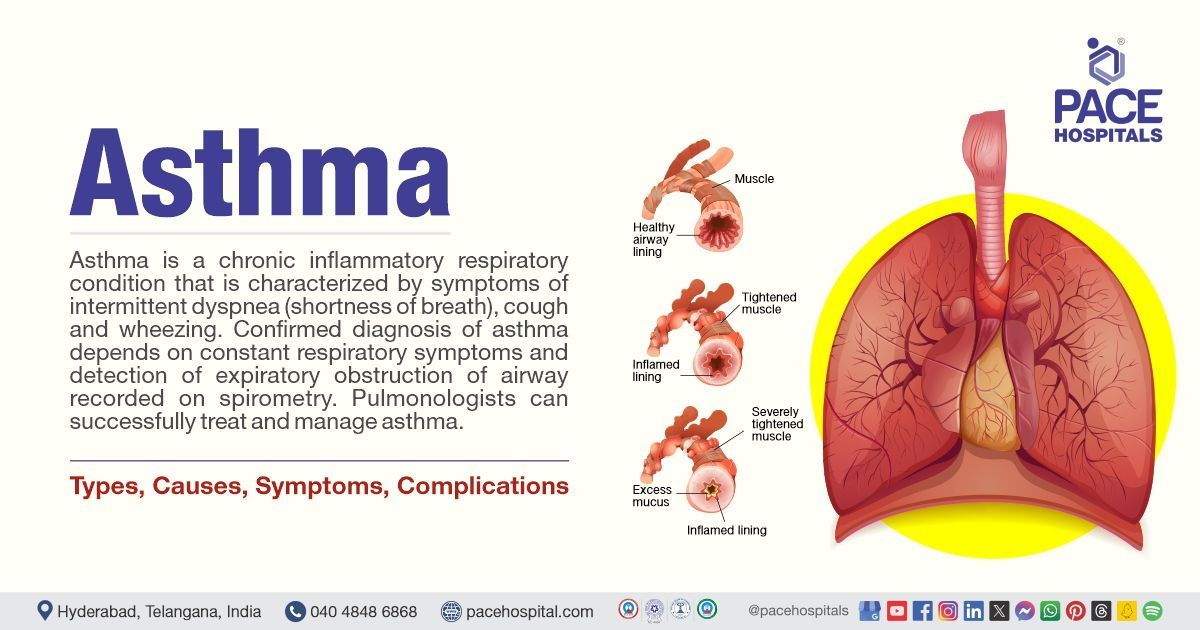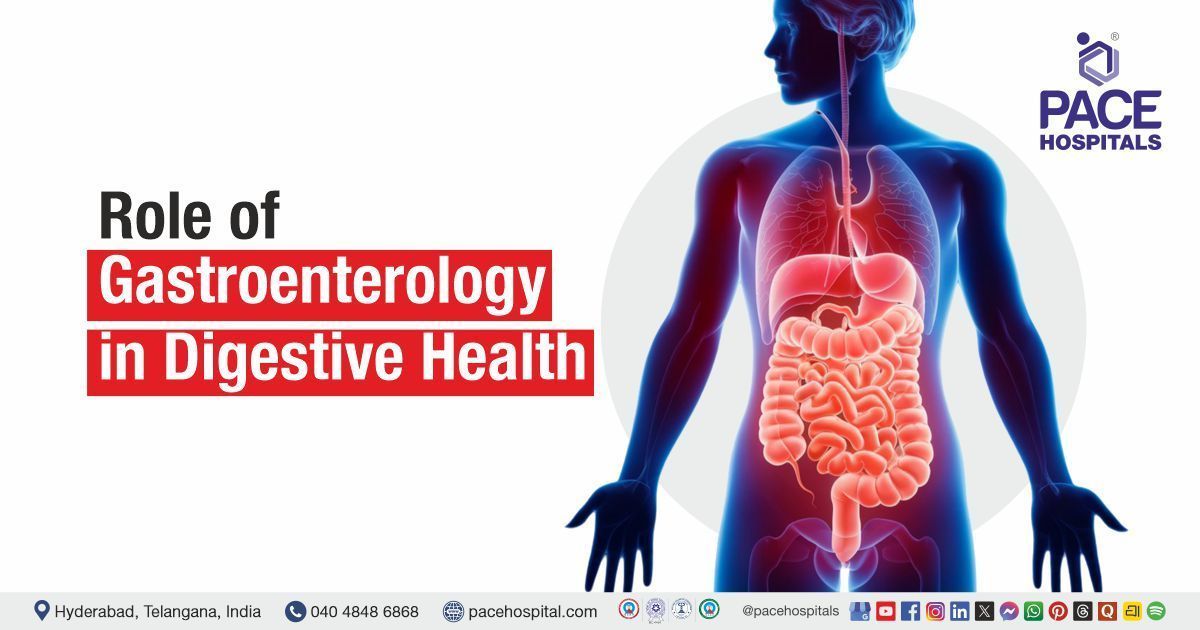Best Asthma Specialist in Hyderabad for Expert Respiratory Care
PACE Hospitals
✅ Recommended by 9,452 Happy Patients. Get hassle-free appointments with asthma specialist doctor.
Dr. Pradeep Kiran Panchadi
MBBS, DNB in Pulmonary Medicine, CCEBDM & Fellowship in Interventional Pulmonology
Experience : 14+ years
Consultant Interventional Pulmonologist, Specialist in Bronchoscopy and EBUS
Specialist
With extensive training and hands-on experience in pulmonary care, Dr. Pradeep Kiran Panchadi is recognized for his focused expertise in advanced diagnostic and therapeutic procedures. He is a specialist in:
- Bronchoscopy
- Endobronchial Ultrasound (EBUS)
- Treating Interstitial Lung Diseases (ILD)
Expertise
Dr. Pradeep Kiran Panchadi brings in-depth knowledge and refined skills in a wide spectrum of interventional pulmonology procedures and respiratory disease management. His areas of expertise include:
- Flexible and rigid bronchoscopy
- Convex and radial EBUS
- Thoracoscopy and pleural biopsies
- Cryobiopsy for ILD diagnosis
- Balloon bronchoplasty
- Airway stenting and debulking
- Foreign body removal
- Bronchial thermoplasty for severe asthma
- Evaluation of ILDs
Airway diseases including:
- Bronchial Asthma
- Chronic Obstructive Pulmonary Disease (COPD)
- Bronchitis
- Pneumonia
Consultation Details
Languages Spoken: English, Hindi, Telugu
Timing: Mon to Sat - 9 am to 5 pm
Location: PACE Hospitals, Hitech City
Top Asthma Doctors in Hyderabad for Accurate Breathing Assessment
PACE Hospitals is known for having the Top Asthma Doctors in Hyderabad, India, offering expert care for individuals experiencing asthma symptoms, breathing difficulties, and allergy-related respiratory problems. Our trusted asthma specialists and experienced Pulmonologists work together to provide personalised care that focuses on accurate diagnosis and long-term control. Each of our asthma doctors is committed to helping patients improve their daily comfort and overall lung health.
Using advanced diagnostic tools such as spirometry, peak flow testing, allergy screening, and imaging when required, our team ensures a clear understanding of asthma severity and triggers. Every asthma specialist doctor in Hyderabad at PACE Hospitals carefully evaluates each patient to design a treatment plan that aligns with their symptoms, lifestyle, and individual needs.
We offer a complete range of Asthma treatment options, including inhaler support, nebulisation, allergy management, preventive medication, and pulmonary rehabilitation. For patients requiring specialised medical attention, our specialists collaborate closely with the best doctor for asthma treatment, ensuring safe and evidence-based care that helps minimise flare-ups and improve long-term respiratory stability.
Known for a steady, patient-first approach, PACE Hospitals remains a trusted choice for individuals seeking the Best Asthma Specialist in Hyderabad, India. Through clear communication, attentive monitoring, and personalised care, we help patients manage their conditions effectively, enabling healthier, more active lives.
Frequently Asked Questions (FAQs) on Asthma
Can asthma be cured or is it a lifelong condition?
Asthma is a chronic but manageable condition. While there is no cure, the right asthma treatment can reduce symptoms and prevent complications. Inhalers, medications, and lifestyle modifications are the mainstays of management. For long-term control, many patients prefer guidance from the best asthma specialist in Hyderabad, Telangana, India.
Is asthma hereditary?
Yes, asthma can run in families. Individuals with a family history of asthma are at a higher risk of developing the condition. Unlike diseases caused by a single gene mutation, asthma is a polygenic and multifactorial disease, meaning multiple genes and environmental triggers contribute to its development. Those with a family history should consider consulting the best asthma doctor in Hyderabad, India.
Who is the best asthma doctor in Hyderabad?
At PACE Hospitals, asthma care is led by the best asthma specialist in Hyderabad, Dr. Pradeep Kiran Panchadi, who treats children and adults with asthma and other breathing problems. He helps patients understand their triggers, evaluates lung function and plans treatment based on symptom severity. Care usually includes inhaler guidance, medications and regular follow-up to keep asthma under control, reduce flare-ups and improve day-to-day breathing comfort.
Are there specific allergens that increase risk of developing asthma?
Yes, both indoor and outdoor allergens can trigger asthma symptoms. Common triggers include dust mites, pet dander, mold, and pollen. Identifying and managing allergen exposure is essential for long-term asthma treatment. For allergy-related asthma, many patients choose the best asthma doctors in Hyderabad at PACE Hospitals.
What are the early warning signs of an asthma attack?
Early warning signs of an asthma attack can vary from person to person. Common indicators include increased mucus production, a runny nose, itchiness around the neck, and raised shoulders while breathing. If symptoms appear frequently, consult the leading doctors for asthma treatment in Hyderabad at PACE Hospitals.
What are the potential complications of uncontrolled asthma?
Uncontrolled asthma can lead to serious health complications such as:
- Decreased lung function
- Osteoporosis and fractures
- Recurrent respiratory infections
- Hypertension and diabetes
- Cataracts and glaucoma
- Obstructive sleep apnea and mood disorders
- In severe cases, respiratory or cardiac failure
For such high-risk cases, the top asthma specialist doctors in Hyderabad at PACE Hospitals can provide advanced management.
How common is asthma in adults and children?
Asthma is one of the most common chronic respiratory conditions globally, affecting over 300 million people. According to health statistics, the prevalence is 9.3% in children and 8% in adults. For persistent symptoms in any age group, visiting a
top asthma specialist in Hyderabad, India is advisable.
Is asthma more common among people with certain occupation?
Yes, occupational asthma is more prevalent in young adults. Around 16% of cases are due to occupational exposure, while 21.5% of individuals suffer from work-aggravated asthma (pre-existing asthma worsened by workplace irritants). If you're experiencing symptoms that worsen at work, reach out to an
asthma best doctor in Hyderabad, India for expert evaluation and personalized asthma treatment.
What are the different types of asthma?
The best asthma doctors in Hyderabad classify asthma into several types:
- Allergic Asthma – Triggered by allergens like pollen, pets, and dust mites.
- Non-Allergic Asthma – Caused by factors such as stress, pollution, or smoke.
- Seasonal Asthma – Occurs during specific times of the year.
- Occupational Asthma – Caused by chemical or irritant exposure at the workplace.
- Childhood Asthma – Starts during childhood and is highly common.
- Adult-Onset Asthma – Develops after the age of 12 and can be more severe.
For type-based treatment, consult the
best doctors for asthma in Hyderabad, Telangana, India.
What is adult-onset asthma and why does it develop later in life?
Adult-onset asthma refers to asthma symptoms that begin in adulthood, typically after age 12 and often between 30–65 years. It is more severe than childhood asthma and progresses faster, particularly in women. Triggers include allergens, chemical exposure, infections, and hormonal changes. For accurate diagnosis, many adults rely on the
best dr for asthma.
Is cough variant asthma different from regular asthma?
Yes, cough variant asthma is a subtype where chronic cough is the only symptom, unlike regular asthma, which includes wheezing, chest tightness, and breathlessness. This type can be easily overlooked without proper diagnosis. If you experience persistent coughing, visit the
best asthma doctor in India at PACE Hospitals, Hyderabad for a detailed assessment.
How does asthma differ in children compared to adults?
Asthma manifests differently across age groups. Childhood asthma is more common in boys and often improves with age, while adult asthma is more common in women and tends to be chronic. In children, severity is influenced by medication use and lung development; in adults, it is linked to allergies, smoking, and
obesity. For age-appropriate guidance, consulting a
good asthma doctor can help create a suitable treatment plan.
Can childhood respiratory infections lead to asthma later in life?
Yes, early-life respiratory infections—especially viral infections—are known to be key contributors to childhood asthma. Interactions between viruses, environmental exposures, and a child’s genetic makeup can increase susceptibility. An
expert child asthma specialist can offer comprehensive evaluation for children with frequent respiratory infections to monitor and manage asthma risk from an early stage.
Can smoking or secondhand smoke increase risk of asthma?
Absolutely. Smoking and secondhand smoke are major risk factors for developing or worsening asthma. Even short-term exposure can cause inflammation and reduce lung function for hours. Prolonged exposure significantly increases the likelihood of wheezing, breathlessness, and other asthma-related symptoms. An
asthma treatment doctor strongly advocates smoking cessation and offers support to minimize exposure-related complications.
Can asthma develop later in life even if didn’t have it as child?
Yes, asthma can appear during adulthood, even if there were no symptoms in childhood. This is referred to as adult-onset asthma, and it is often more severe with faster lung function decline. Factors like allergens, occupational exposure, hormonal changes, or infections may trigger it. If you're experiencing new respiratory symptoms, consult an
asthma special doctor for accurate diagnosis and advanced asthma treatment.
Is shortness of breath, chest tightness, difficulty breathing always a sign of an asthma attack?
Not always. While these are classic asthma symptoms, they can also occur in conditions like heart disease, lung infections, panic attacks, or anxiety disorders. For an accurate diagnosis, it’s essential to consult a
pulmonologist. At PACE Hospitals, our
asthma specialists provide comprehensive testing to identify the root cause and recommend the appropriate asthma treatment or alternative care.
Are there any unusual symptoms of asthma one should be aware of?
Yes, some less common but serious symptoms that may indicate a severe asthma episode include bluish lips, extreme fatigue, confusion, increased heart rate, profuse sweating, and difficulty speaking. If you or someone around you experiences these signs, seek emergency care or contact an
asthma doctor specialist immediately.
How do asthma symptoms differ between children and adults?
Though symptoms like chest tightness, coughing, shortness of breath, and wheezing are common in both children and adults, their frequency and severity differ. Children may show intermittent symptoms, fatigue, poor feeding, and flaring nostrils, while adults often have more persistent asthma.
For tailored care, visit an
asthma treatment doctor.
Can asthma lead to permanent lung damage?
Yes. Long-standing, uncontrolled asthma may result in permanent structural changes in the airways, including fibrosis, inflammation, and thickening of airway walls. This can lead to lung fibrosis, reducing responsiveness to medication. Timely management with an
expert asthma specialist can prevent progression.
Can asthma increase the risk of lung infections, such as pneumonia?
Absolutely. People with asthma have a weakened respiratory system and are at a higher risk of developing lung infections like pneumonia—especially after contracting viral illnesses like the flu. Studies show that adults aged 65 and older with asthma are 5.9 times more likely to develop pneumonia. A
good asthma doctor can recommend preventive strategies such as vaccination.
Are asthma complications more severe for the elderly?
Yes, elderly patients with asthma are at a higher risk of developing complications due to the presence of other chronic conditions like
COPD, heart disease, or diabetes. Additionally, the elderly often experiences fewer visible asthma symptoms, making diagnosis more challenging. Evaluation from the
best asthma doctor Hyderabad, Telangana, India is beneficial.
What tests are used to diagnose asthma?
To confirm a diagnosis of asthma, a pulmonologist or asthma doctor in Hyderabad may recommend lung function tests along with supporting diagnostics. At PACE Hospitals, we follow evidence-based protocols, including:
- Spirometry – Measures the volume and speed of air exhaled.
- Peak Expiratory Flow (PEF) – Assesses airflow after maximum effort.
- Bronchodilator Response Test – Evaluates changes in breathing post-bronchodilator use.
Allergy tests, FeNO (Fractional Exhaled Nitric Oxide), and Chest CT scans are also used for a comprehensive assessment by our asthma specialist doctors at PACE Hospitals, Hyderabad, India.
Is allergy testing necessary for asthma diagnosis?
Yes, allergy testing plays a vital role, especially when asthma has an allergic component. Though it does not directly diagnose asthma, it helps identify triggers such as dust mites, pollen, or mold. The
asthma specialists at PACE Hospitals, often recommend allergy tests as part of your personalized asthma treatment plan.
What is spirometry, how does it help diagnose asthma?
Spirometry is a key diagnostic tool used to assess lung function. It measures the Forced Expiratory Volume in 1 second (FEV1) and Forced Vital Capacity (FVC). Asthma typically shows an obstructive pattern — reduced FEV1/FVC ratio. At PACE Hospitals, spirometry helps tailor accurate diagnosis and treatment strategies.
What are the treatment options available for asthma?
Asthma treatment focuses on long-term disease control and reducing symptoms. Our team of top asthma specialist doctors in Hyderabad at PACE Hospitals uses a combination of therapies:
- Controller medications: Inhaled corticosteroids (ICS), leukotriene receptor antagonists (LTRA), long-acting muscarinic antagonists (LAMA).
- Reliever medications: Rapid-acting beta-2 agonists and anticholinergics.
- Allergen-specific immunotherapy: For allergic asthma to reduce sensitivity to triggers.
We provide customized asthma care based on severity and patient profile.
What is the role of immunotherapy in asthma treatment?
Immunotherapy is highly effective for allergic asthma, especially when symptoms are triggered by dust mites or pollens. It helps reduce airway inflammation, improves quality of life, and decreases dependence on bronchodilators. The asthma doctors at PACE Hospitals, Hyderabad, may recommend subcutaneous or sublingual immunotherapy as part of long-term asthma control.
Are there any surgical options for asthma treatment?
While rare, surgical interventions may be considered in complex or drug-resistant asthma cases. These include:
- First-generation: Glomectomy, vagotomy, and ganglionectomy.
- Second-generation: Neurostimulator implants for vagus and sympathetic nerves.
- Third-generation: Implantation of programmable microchips.
Such options are evaluated carefully after thorough assessment.
What is bronchial thermoplasty and is it suitable for all asthma conditions?
Bronchial thermoplasty is an FDA-approved, non-pharmacological procedure for severe asthma. It uses controlled radiofrequency energy during bronchoscopy to reduce smooth muscle mass in the airways, thereby decreasing asthma attacks. Not all lobes of the lungs are treated (e.g., the right middle lobe is excluded) and this is recommended only for selected patients. Suitability should be assessed by the
best pulmonologist for asthma.
What our patients have to say
Experts Perspective
Related Articles
Why choose PACE Hospitals?
- A Multi-Super Speciality Hospital.
- NABH, NABL, NBE & NABH - Nursing Excellence accreditation.
- State-of-the-art Liver and Kidney transplant centre.
- Empanelled with all TPAs for smooth cashless benefits.
- Centralized HIMS (Hospital Information System).
- Computerized health records available via website.
- Minimum waiting time for Inpatient and Outpatient.
- Round-the-clock guidance from highly qualified super specialist doctors, surgeons and physicians.
- Standardization of ethical medical care.
- 24X7 Outpatient & Inpatient Pharmacy Services.
- State-of-the-art operation theaters.
- Intensive Care Units (Surgical and Medical) with ISO-9001 accreditation.
Share on
Request an appointment
Fill in the appointment form or call us instantly to book a confirmed appointment with our super specialist at 04048486868
Appointment request - health articles
Recent Articles















